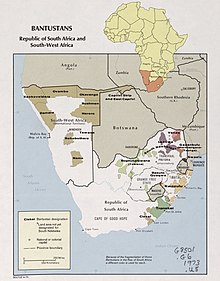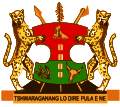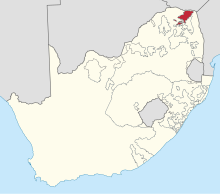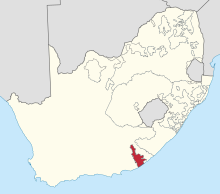List of leaders of the TBVC states
Appearance
(Redirected fromHeads of State of Ciskei)

This article lists theleaders of the TBVC states,the fourBantustanswhich were declarednominally independentby the government of theRepublic of South Africaduring the period ofapartheid,which lasted from 1948 to 1994. Their independence wasnot recognizedoutside South Africa.
The bantustans with nominal independence were namely:Transkei(1976),[a][1]Bophuthatswana(1977),[b][2][3]Venda(1979)[c][4]andCiskei(1981),[d][5]hence the abbreviation TBVC.
The TBVC states were reintegrated into South Africa in the wake of the first post-apartheid general election inApril 1994.[6]
Transkei
[edit]| Leader of Transkei | |
|---|---|
 Coat of arms of Transkei | |
 Flag of Transkei | |
Incumbent None | |
| Status | |
| Member of | Military Council (1987–1994) (head of government) |
| Seat | Umtata |
| Term length | No fixed term |
| Formation |
|
| First holder |
|
| Final holder |
|
| Abolished | 26 April 1994 |

Heads of state
[edit]| No. | Portrait | Name (Birth–Death) |
Term of office | Political affiliation | |||
|---|---|---|---|---|---|---|---|
| Took office | Left office | Time in office | |||||
| Presidents | |||||||
| 1 | 
|
Botha Sigcau (died 1978) |
26 October 1976 | 1 December 1978†[7] | 2 years, 36 days | TNIP | |
| – | 
|
Zwelibanzi Maneli Mabandla (1906–?) Acting |
1 December 1978 | 20 February 1979 | 81 days | TNIP | |
| 2 | 
|
Kaiser Matanzima (1915–2003) |
20 February 1979[8] | 20 February 1986 (retired) |
7 years | TNIP | |
| 3 | 
|
Tutor Ndamase (1921–1997) |
20 February 1986 | 26 April 1994 | 8 years, 66 days | TNIP | |
| Independent | |||||||
Heads of government
[edit]| No. | Portrait | Name (Birth–Death) |
Term of office | Political affiliation | |||
|---|---|---|---|---|---|---|---|
| Took office | Left office | Time in office | |||||
| Chief Minister | |||||||
| 1 | 
|
Kaiser Matanzima (1915–2003) |
6 December 1963 | 26 October 1976 | 12 years, 325 days | TNIP | |
| Prime Ministers | |||||||
| (1) | 
|
Kaiser Matanzima (1915–2003) |
26 October 1976 | 20 February 1979 (become president) |
2 years, 117 days | TNIP | |
| 2 | 
|
George Matanzima (1918–2000)[e] |
20 February 1979 | 24 September 1987 (resigned)[9] |
8 years, 216 days | TNIP | |
| – | 
|
Dumnisani Gladstone Gwadiso (born 1952) Acting |
25 September 1987 | 5 October 1987 | 10 days | TNIP | |
| 3 | 
|
Stella Sigcau (1937–2006)[f] |
5 October 1987 | 30 December 1987 (deposed)[10][11] |
86 days | TNIP | |
| Chairman of the Military Council and of the Council of Ministers | |||||||
| 4 | Bantu Holomisa (born 1955) |
30 December 1987 | 26 April 1994 | 6 years, 117 days | Nonpartisan (militaryofficer) | ||
Timeline
[edit]
Foreign ministers
[edit]| Term | Name |
|---|---|
| 1976–1980 | Digby Koyana |
| 1980–1983 | G. T. Vika |
| 1983–1986 | Mtutuzela Lujabe |
| 1986–1988 | Caleb Songca |
| 1988–1989 | E. R. G. Keswa |
| 1989–1992 | Thembekile Enoch KaTshunungwa |
| 1992–1994 | Bantu Holomisa |
| Source:[12] | |
Bophuthatswana
[edit]| Leader of Bophuthatswana | |
|---|---|
 Coat of arms of Bophuthatswana | |
 Flag of Bophuthatswana (1972–1994) | |
Incumbent None | |
| Status | |
| Seat | |
| Term length | No fixed term |
| Formation | June 1968 |
| First holder | Lucas Mangope (Chief Executive Officer of the Tswana Territorial Authority) |
| Final holder | Lucas Mangope (President) |
| Abolished | 13 March 1994 |
| Superseded by | Administrators of theTransitional Executive Council |

Heads of state and government
[edit]| No. | Portrait | Name (Birth–Death) |
Term of office | Political affiliation | ||||
|---|---|---|---|---|---|---|---|---|
| Took office | Left office | Time in office | ||||||
| 1 | Chief Executive Officer of the Tswana Territorial Authority | |||||||

|
Lucas Mangope (1923–2018) |
June 1968 | 1 May 1971 | 2 years, 11 months | BNP | |||
| Chief Executive Councillor | ||||||||

|
Lucas Mangope (1923–2018) |
1 May 1971 | 1 June 1972 | 1 year, 31 days | BNP | |||
| Chief Minister | ||||||||

|
Lucas Mangope (1923–2018) |
1 June 1972 | 6 December 1977 | 5 years, 188 days | BNP | |||
| BDP (from 1974) | ||||||||
| President | ||||||||

|
Lucas Mangope (1923–2018) |
6 December 1977 | 13 March 1994 (fled)[g] |
16 years, 97 days | BDP | |||
| N/A | 
|
Rocky Malebane-Metsing (1949–2016)[h] |
10 February 1988 | Hours | PPP | |||
| Administrators (Transitional Executive Council) | ||||||||

|
Tjaart van der Walt (1934–2019) |
13 March 1994 | 26 April 1994 | 44 days | ||||

|
Job Mokgoro (born 1948) |
ANC | ||||||
Foreign ministers
[edit]| Term | Name |
|---|---|
| 1977–1987 | T. M. Molatlhwa |
| 1987–1990 | Solomon L. L. Rathebe |
| 1990–1991 | G. S. M. Nkau |
| 1991–1994 | Thomas M. Setiloane |
| Source:[12] | |
Venda
[edit]| Leader of Venda | |
|---|---|
 Coat of arms of the Republic of Venda | |
 Flag of Venda (1973–1994) | |
Incumbent None | |
| Status | |
| Member of | Council of National Unity (1990–1994) |
| Seat |
|
| Term length | No fixed term |
| Formation | June 1969 |
| First holder | Patrick Mphephu (Chief Executive Officer of the Venda Territorial Authority) |
| Final holder | Tshamano Ramabulana (Head of State [Chairman of the Council of National Unity]) |
| Abolished | 26 April 1994 |

Heads of state and government
[edit]| No. | Portrait | Name (Birth–Death) |
Term of office | Political affiliation | ||||
|---|---|---|---|---|---|---|---|---|
| Took office | Left office | Time in office | ||||||
| 1 | Chief Executive Officer of the Venda Territorial Authority | |||||||

|
Patrick Mphephu (c.1924–1988) |
June 1969 | 1 June 1971 | 2 years | NPV | |||
| Chief Executive Councillor | ||||||||

|
Patrick Mphephu (c.1924–1988) |
1 June 1971 | 1 February 1973 | 1 year, 245 days | NPV | |||
| Chief Minister | ||||||||

|
Patrick Mphephu (c.1924–1988) |
1 February 1973 | 13 September 1979 | 6 years, 224 days | NPV | |||
| Presidents | ||||||||

|
Patrick Mphephu (c.1924–1988) |
13 September 1979 | 17 April 1988†[15] | 8 years, 217 days | NPV | |||
| 2 | 
|
Frank Ravele (1926–1999) |
17 April 1988 | 10 May 1988 | 1 year, 353 days | NPV | ||
| 10 May 1988 | 5 April 1990 (deposed)[16] | |||||||
| Heads of State (Chairmen of the Council of National Unity) | ||||||||
| 3 | 
|
Gabriel Ramushwana (1941–2015) |
5 April 1990 | 25 January 1994 | 3 years, 266 days | Nonpartisan (militaryofficer) | ||
| 4 | 
|
Tshamano Ramabulana (1940–2020) |
25 January 1994 | 26 April 1994 | 91 days | Nonpartisan (militaryofficer) | ||
Foreign ministers
[edit]| Term | Name |
|---|---|
| 1979–1980 | G. M. Ramabulana |
| 1980–1986 | A. M. Madzivhandila |
| 1986–1989 | Gota E. R. B. Nesengani |
| 1989–1990 | C. A. Nelwamondo |
| 1990–1992 | G. M. Ligege |
| 1992–1994 | V. S. Landela |
| 1994 | Gabriel Ramushwana |
| Source:[12] | |
Ciskei
[edit]| Leader of Ciskei | |
|---|---|
 Coat of arms of Ciskei | |
 Flag of Ciskei | |
Incumbent None | |
| Status | |
| Member of | Military Committee / Council of State (1990–1994) |
| Seat | |
| Term length | No fixed term |
| Formation | June 1968 |
| First holder | Thandathu Jongilizwe Mabandla (Chief Executive Officer of the Ciskei Territorial Authority) |
| Final holder | Oupa Gqozo (Chairman of the Military Committee and of the Council of State) |
| Abolished | 22 March 1994 |
| Superseded by | Administrators of theTransitional Executive Council |

Heads of state and government
[edit]| No. | Portrait | Name (Birth–Death) |
Term of office | Political affiliation | ||||
|---|---|---|---|---|---|---|---|---|
| Took office | Left office | Time in office | ||||||
| 1 | Chief Executive Officer of the Ciskei Territorial Authority | |||||||

|
Thandathu Jongilizwe Mabandla (1926–2021) |
June 1968 | 1 June 1971 | 3 years | CNP | |||
| Chief Executive Councillor | ||||||||

|
Thandathu Jongilizwe Mabandla (1926–2021) |
1 June 1971 | 1 August 1972 | 1 year, 61 days | CNP | |||
| Chief Ministers | ||||||||

|
Thandathu Jongilizwe Mabandla (1926–2021) |
1 August 1972 | 21 May 1973 | 293 days | CNP | |||
| 2 | 
|
Lennox Sebe (1926–1994)[i] |
21 May 1973 | June 1975 | 2 years, 1 month | CNIP | ||
| – | 
|
Charles Sebe (died 1991) Acting[j] |
June 1975[17] | 24 October 1975[17] | 4 months | Nonpartisan (militaryofficer) | ||
| (2) | 
|
Lennox Sebe (1926–1994)[k] |
24 October 1975[17] | 4 December 1981 | 6 years, 41 days | CNIP | ||
| President | ||||||||

|
Lennox Sebe (1926–1994)[l] |
4 December 1981 | 4 March 1990 (deposed)[18] |
8 years, 90 days | CNIP | |||
| Chairman of the Military Committee and of the Council of State | ||||||||
| 3 | 
|
Oupa Gqozo (born 1952) |
4 March 1990 | 22 March 1994 (resigned)[19] |
4 years, 18 days | Nonpartisan (militaryofficer) | ||
| ADM (from 1991) | ||||||||
| Administrators (Transitional Executive Council) | ||||||||

|
Pieter van Rensburg Goosen | 23 March 1994 | 26 April 1994 | 34 days | ||||

|
Bongani Blessing Finca (born 1953) |
|||||||
Foreign ministers
[edit]| Term | Name |
|---|---|
| 1981–1983 | Ray Mali |
| 1983–1990 | B. N. Pityi |
| 1990–1991 | M. S. Manzi |
| 1991–1993 | Oupa Gqozo |
| 1993 | Thamsanqa Linda |
| 1993–1994 | Mickey Webb |
| Source:[12] | |
See also
[edit]- Bantu Authorities Act, 1951
- Promotion of Bantu Self-government Act, 1959
- Bantu Homelands Citizenship Act, 1970
- Bantu Homelands Constitution Act, 1971
- Foreign relations of South Africa during apartheid
Notes
[edit]- ^The Status of Transkei Act 100 of 1976 granted Transkei "independence" with effect from 26 October 1976.
- ^The Status of Bophuthatswana Act 89 of 1977 granted Bophuthatswana "independence" with effect from 6 December 1977.
- ^The Status of Venda Act 107 of 1979 granted Venda "independence" with effect from 13 September 1979.
- ^The Status of Ciskei Act 110 of 1981 granted Ciskei "independence" with effect from 4 December 1981.
- ^Brother of Kaiser Matanzima.
- ^Daughter of Botha Sigcau.
- ^Forced to flee during the1994 crisis.[13]
- ^In rebellion staged by members of themilitary.Coup attempt crushed by theSADFtroops.[14]
- ^Gained power in the1973 election.[17]
- ^Brother of Lennox Sebe.
- ^Proclaimed independence following the1980 referendum.
- ^Declaredpresident for lifein 1983.
References
[edit]- ^Henry Kamm(26 October 1976)."Transkei, a South African Black Area, Is Independent".The New York Times.Retrieved1 April2019.
- ^"South Africa Makes 2d Black Homeland Independent Nation".The New York Times.Reuters. 6 December 1977.Retrieved5 October2022.
- ^"An Empty Ceremony in South Africa".The New York Times.6 December 1977.Retrieved1 April2019.
- ^"South Africa Starts a New Nation".The New York Times.UPI. 14 September 1979.Retrieved1 April2019.
- ^Joseph Lelyveld(4 December 1981)."CISKEI 'HOMELAND' DECLARED A SEPARATE NATION".The New York Times.Retrieved1 April2019.
- ^All Bantustans (both nominally independent and self-governing) were dismantled and their territories reincorporated into South Africa with effect from 27 April 1994, in terms ofsection 1(2)andSchedule 1of theConstitution of the Republic of South Africa, 1993,the so-called "Interim Constitution" which abolished apartheid in South Africa. The text of this Interim Constitution, which came into force on 27 April 1994, coinciding with the beginning of the first democratic elections, is available online atConstitution of the Republic of South Africa, 1993 as of 27 April 1994.
- ^"Chief Botha Sigcau, 66, First Transkei President".The New York Times.2 December 1978.Retrieved2 April2019.
- ^"President Elected in Transkei".The New York Times.Reuters. 20 February 1979.Retrieved5 October2022.
- ^"Six Cabinet Ministers Resign in Transkei Scandal".The New York Times.25 September 1987.Retrieved1 April2019.
- ^"Army Coup in South African Homeland".The New York Times.31 December 1987.Retrieved1 April2019.
- ^"Army Stages Coup in Black S. Africa Area: General Takes Over in Transkei Region, Charges Corruption".The Los Angeles Times.30 December 1987.Retrieved6 April2019.
- ^abcd"Foreign ministers S-Z".rulers.org.B. Schemmel.Retrieved15 April2019.
- ^"A Homeland's Agony".The New York Times.13 March 1994.Retrieved1 April2019.
- ^John D. Battersby (11 February 1988)."South Africa Quells Coup Attempt in a Homeland".The New York Times.Retrieved1 April2019.
- ^"Patrick Mphephu, Homeland Leader, 63".The New York Times.21 April 1988.Retrieved2 April2019.
- ^"Security forces stage coup in S. African homeland".UPI Archives. 5 April 1990.Retrieved1 April2019.
- ^abcdElections in South Africa's Apartheid-Era Homelands "Bantustans"African Elections Database
- ^"'HOMELAND' LEADER DEPOSED IN CISKEI ".The New York Times.5 March 1990.Retrieved1 April2019.
- ^"A 2d Homeland Is Taken Over By South Africa".The New York Times.23 March 1994.Retrieved2 April2019.
External links
[edit]- ^The dates and designations given on the sitesWorld StatesmenandRulers are partially inaccurate.
